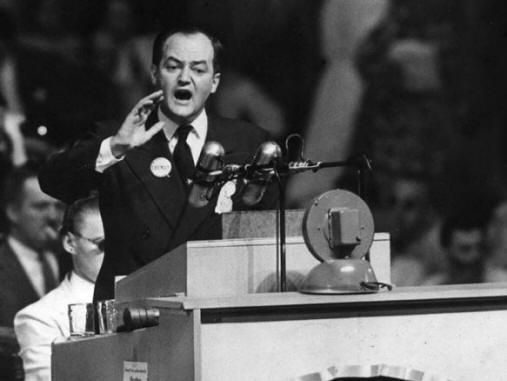
Hubert Horatio Humphrey at the 1948 Democratic Convention
Last week was the 103rd birthday of great American, Hubert H. Humphrey (1911-1978).
Not only a great American but a great liberal, a great Democrat and a courageous leader.
A few years ago, on the occasion of Hubert Humphrey’s 100th birthday, I had the good fortune to come across an article on his life and even more fortunate to discover a speech he made in 1948 which forever changed the face of the Democratic party and of our country.
Speeches can contain words to live by, words that call us to action for an important cause and words that connect to our deepest feelings about fairness and compassion.
In 1948, Hubert H. Humphrey was the 37 year old mayor of Minneapolis and a candidate for the U.S. Senate. As head of the Minnesota delegation to the nominating convention that year, he led a group who wanted a plank in the party’s platform to include a federal fair employment commission. Southern Democrats, who were upset by the civil rights movement, threatened a walk out.
Humphrey made the speech anyway despite being told that it could risk President Harry Truman’s election chances in the fall.
He carefully set the stage and identified the risks.
I realize that I am dealing with a charged issue – with an issue which has been confused by emotionalism on all sides. I realize that there are those here – friends and colleagues of mine, many of them – who feel as deeply as I do about this issue and who are yet in complete disagreement with me.
Because of this very respect – because of my profound belief that we have a challenging task to do here — because good conscience demands it – I feel I must rise at this time to support this report – a report that spells out our democracy, a report that the people will understand and enthusiastically acclaim.
Humphrey quoted the keynote speaker, Senator Alben Barkley (D-KY) who said of Thomas Jefferson:
“He did not proclaim that all white, or black, or red, or yellow men are equal; that all Christian or Jewish men are equal; that all Protestant and Catholic men are equal; that all rich or poor men are equal; that all good or bad men are equal.“What he declared was, that all men are equal; and the equality which he proclaimed was equality in the right to enjoy the blessings of free government in which they may participate and to which they have given their consent.”
Putting country above party, a concept sorely missing in today’s discourse, Humphrey continued:
Yes, this is far more than a party matter. […]I do not believe that there can be any compromise of the guarantees of civil rights which I have mentioned.
Was he anticipating the “keep your powder dry” argument?
There are those who say to you – we are rushing this issue of civil rights. I say we are 172 years late.There are those who say – this issue of civil rights is an infringement on states rights. The time has arrived for the Democratic party to get out of the shadow of state’s rights and walk forthrightly into the bright sunshine of human rights.
People – human beings – this is the issue of the 20th century. People – all kinds and sorts of people – look to America for leadership – for help – for guidance.
My friends – my fellow Democrats – I ask you for a calm consideration of our historic opportunity. […]
For all of us here, for the millions who have sent us, for the whole two billion members of the human family – our land is now, more than ever, the last best hope on earth. I know that we can – I know that we shall – begin here the fuller and richer realization of that hope – that promise of a land where all men are free and equal, and each man uses his freedom and equality wisely and well.
The Southerners walked out, Senator Strom Thurmond of South Carolina ran on the States’ Rights Democratic Party ticket, Dewey did NOT defeat Truman and the Democratic party would go on to sponsor civil rights legislation that would lose them the southern states but underscore their belief in the worth of all human beings, a belief that defines the party to this day.
So not only a great speech but an important speech and a history changing speech.
And because reading about history often yields bonuses, here is a Hubert H. Humphrey quote I found that is just as applicable in 2014 as it was in 1977 when he uttered it:
It was once said that the moral test of Government is how that Government treats those who are in the dawn of life, the children; those who are in the twilight of life, the elderly; and those who are in the shadows of life, the sick, the needy and the handicapped.
As we are faced in this election year with political adversaries who believe that our country cannot afford to care for our elderly, our sick, our needy and our handicapped, remember that when people speak up they can energize a party and inspire a generation of Americans to do the right thing.
Another Hubert Humphrey quote, especially pertinent given the attacks on Democrats this year:
“Compassion is not weakness, and concern for the unfortunate is not socialism.”
Our party has a long history of leaders showing courage when it is politically risky. It is a history we can be proud of.
23 comments